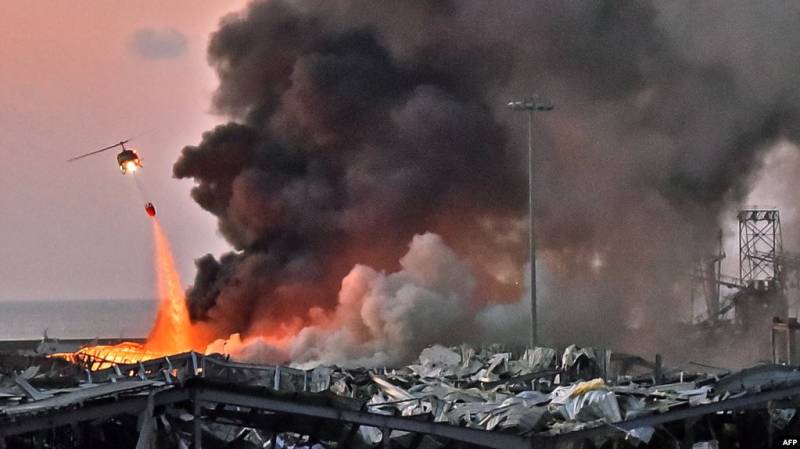In the wake of Tuesday's deadly port explosion in Lebanon’s capital, Beirut’s governor said that the material damage from the incident will cost some $3-5 billion.
"Beirut has become a devastated city… half of it destroyed and hundreds of thousands of residents will not be able to return to their homes before two or three months," Marwan Abboud told reporters Wednesday.
On Tuesday, a massive explosion rocked the Port of Beirut, killing at least 100 and injuring 4,000 others and caused massive damage in several neighborhoods of the capital.
The governor said there were “no accurate numbers regarding the missing."
The explosion took place as Lebanon's economy was facing its worst crisis in decades.
It also happened days before Friday’s scheduled verdict by a UN-backed court in the case of the assassination of former Prime Minister Rafik al-Hariri.
Lebanon says to use other ports in Sidon, Tyre
Lebanese Minister of Public Works and Transport Michael Najjar said on Wednesday the explosion at the Port of Beirut has caused massive damage and destroyed most of the port's facilities and warehouses.
Speaking to Lebanese local channel "LBC", Najjar said the Lebanese authorities have started to set alternative plans for the Beirut port, which will take time to be rebuilt.
'We will depend on the Tripoli port in northern Lebanon, as we are currently evaluating its capacity along with other ports in Sidon and Tyre,” he said.
On Tuesday, a massive explosion rocked the port, killing at least 100 and injuring 4,000 others and caused massive damage in several neighborhoods of the capital.
Prime Minister Hassan Diab announced Wednesday a day of mourning and promised "those responsible for this catastrophe will pay the price". Diab also appealed for international assistance to help afflicted Lebanon.
Following the deadly blast, the Lebanese Supreme Defense Council has declared a state of emergency for two weeks in Beirut. The capital was also declared a "disaster area" due to the incident.
Beirut port: a major shipping point under rubble
As Lebanon’s government looks for international and domestic solutions to face its current economic crisis, the tragic explosion of the Port of Beirut has added a heavy burden to the country’s already exhausted country.
The explosion has increased the pain of a country that suffers from a severe economic crisis and severe political polarization, in a scene where regional and international parties overlap.
The Port of Beirut is the largest shipping and clearing point in Lebanon, through which approximately 70% of the incoming and outgoing trade traffic to and from the country passes, according to the port’s website.
The port is located in a strategic area linking the commercial markets of Asia, Europe and Africa, which reduces the duration of commercial navigation voyages compared to other routes.
The port has a direct connection with 56 ports on the three continents, while receiving and exporting goods in cooperation with 300 other ports worldwide.
In 2018, the Port of Beirut received about 7.05 million tons of goods, representing 72% of the total imports of goods across the sea, compared to exports of nearly one million tons, representing 78% of the total volume of exports.
The port’s data shows that its total revenues during 2019 did not exceed $200 million compared to $313 million in 2018, while revenues did not exceed $90 million in 2005.
In a quick effort by the Lebanese authorities to mitigate the losses, the Supreme Defense Council in Lebanon recommended preparing the port of Tripoli in northern Lebanon to secure commercial voyages for imports and exports.






